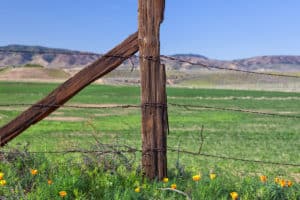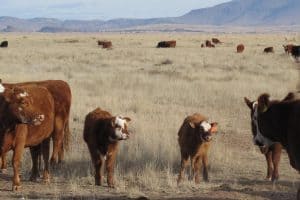One of the most discouraging events on a farm is the untimely death of an animal. Whether it’s a humble chicken or a favorite horse, the landowner feels that he did something wrong…or didn’t prevent something wrong from happening—and often that’s the case.
Apart from the unease of these passings, there’s always a dollar cost that rubs it in.
I found a young steer the other day, sprawled on top of a flush-to-the-ground water tank that is fed by the overflow from our swimming pond. The steer’s head and legs were out of the water, so I don’t think it drowned.
But I noticed places when he had scraped hide off his inside legs and belly. I thought, perhaps, he had dunked himself in the tank to cool off during one of our unseasonably hot days and then couldn’t get completely out, even though that’s how I found him. Clearly, he struggled against the metal edge of the tank, but maybe something else was going on.
Several trees and plants are toxic to horses and cattle. Black cherry, peach and plum produce a precursor to cyanide when their leaves wilt. The dead leaves of the black cherry, for example, don’t appear to harm cattle when they are shed naturally in the fall. But if a windstorm knocks down a cherry in the summer, the leaves need to be burned immediately to prevent livestock from eating them. A very large cherry with branches that a highly motivated steer could reach if he stretched up as far as possible is about 50 yards from the water tank. It’s possible that he cropped some leaves and berries, and maybe I’m wrong about them being harmless when alive and green.
It’s also possible that as a young steer — about 500 pounds — who came onto the farm only a few weeks earlier, he had been stressed in handling and that led to pneumonia. So I spent an hour yesterday looking carefully and soulfully up the noses of the 30 survivors in the back pasture, searching for the strings of white snot and the sound of labored breathing that indicates sickness. None had any sign of illness. So pneumonia in a single, weak individual is a possible explanation.
One dreadful year, I brought home a bunch from the market as our pasture was flushing green at the end of April. They must have been denied access to early grass on the seller’s farm, because seven dropped dead from clover bloat within 48 hours. That had never happened before…or since.
I noticed that the pond’s main overflow pipe had settled slightly lower over the last year so that it was now just a hair below the small overflow pipe into the water tank. This meant that the water tank would only be fed when rain elevated the pond rather than all the time as originally designed. That meant the water in the tank could have been stagnant and possibly harmful.
I had another theory about this pond. For a number of years, I’d thrown a little copper sulfate into it to control algae. It’s toxic to fish, but its concentration in the pond was so low that it should not have harmed a 500-pound animal. I wasn’t even close to applying one pound per acre foot. But who knows?
It’s possible that the water tank could have become contaminated with bacteria from some creature falling in and dieing. I should have set the tank higher than ground level when I dug it in, but didn’t because it was easier to emplace it under the pipe than rig up an alternative. Maybe I’ll add a vertical extension to the tank this fall. Doing things wrong the first time always costs more in the long run.
It’s possible that a rattlesnake popped the steer, but that’s highly unlikely. I’ve never seen one in our pastures in almost 30 years, but then again I had never seen four bears in my front yard until two years ago.
Cattle fall victim to other diseases, though pneumonia is the usual culprit. Vaccination is routine and effective for their most common afflictions. A parasitic disease like coccidiosis is a possibility, but I’ve never had any problem with it and our pastures are cleaner than most because of rotational grazing. But it could have been sick when it arrived here.
Lightning is the best choice in a death like this, because of lightning insurance. But that wasn’t it.
So this death remains unresolved. It’s one of the mysteries of living out here.
This content may not be used or reproduced in any manner whatsoever, in part or in whole, without written permission of LANDTHINK. Use of this content without permission is a violation of federal copyright law. The articles, posts, comments, opinions and information provided by LANDTHINK are for informational and research purposes only and DOES NOT substitute or coincide with the advice of an attorney, accountant, real estate broker or any other licensed real estate professional. LANDTHINK strongly advises visitors and readers to seek their own professional guidance and advice related to buying, investing in or selling real estate.








Sorry for your loss.